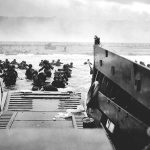It’s the time of year when thoughts start to turn the annual Poppy Appeal organised by The Royal British Legion as we move towards Remembrance Sunday which this year will be the 10 November.
Every year, the Legion organises a countrywide network of Poppy Appeal collectors, volunteers who give their time willingly to help raise money for this wonderful charity, that honours our servicemen, past and present.
But why the poppy?
The significance of the poppy as a lasting memorial symbol to the fallen was first realised by the Canadian surgeon John McCrae in his poem In Flanders Fields. The poppy came to represent the immeasurable sacrifice made by his comrades and quickly became a lasting memorial to those who died in World War One. Inspired by McCrae’s poem, an American War Secretary, Moina Michael, bought poppies to sell to her friends to raise money for Servicemen in need after the First World War. It was adopted by The Royal British Legion in 1921 as a symbol for the Poppy Appeal in aid of those serving in the British Armed Forces. The symbol of the poppy today represents Remembrance of the past and hope for the future.
The appeal
This year, The Royal British Legion is asking communities across Britain to come together, join together and remember together the service and sacrifice, friendship and collaboration of the men and women of Britain, the Commonwealth and Allied nations who fought together 75 years ago.
Allies from the Commonwealth and other nations had fought shoulder to shoulder with Britain since the start of the Second World War, but in 1944 this collaboration would result in victory in three critical battles; Monte Cassino, D-Day and Kohima & Imphal.
Three campaigns, many nations
At Monte Cassino, a 240,000 strong Allied Army with contingents from six continents, opened the way to the liberation of Rome; at D-Day thirteen nations collaborated to land 156,000 men in Normandy; and at Kohima and Imphal one of the most ethnically diverse Armies in history came together to win one of the most remarkable victories of the war.
Where does the money raised go?
The charity aims to support both serving and ex-serving personnel as well as the whole of the Armed Forces community, including dependents and carers. It doesn’t matter what service you served in, or in what capacity, the Royal British Legion is there to help you.
As such, full service personnel are of course supported but so are reserve or auxiliary personnel and those who have previously served. For many, the Legion provides invaluable help and assistance and in a wide variety of ways.
We should never forget the sacrifice that many, many people made to serve their country and to keep its citizens safe. Supporting the Poppy Appeal is one way of doing this. To find out more visit
www.britishlegion.org.uk.




